|

www.countrybreeds.co.uk

Baylham House Rare Breeds Farm
Mill Lane, Baylham, Ipswich, Suffolk, IP6 8LG
Tel. 01473 830 264
Email : breeds@baylham-house-farm.co.uk
Web Site : www.baylham-house-farm.co.uk
At Baylham House Rare
Breeds Farm we have six small flocks of rare sheep, two breeds of cattle, pygmy goats,
chickens and three breeds of pig including Kune Kunes, the wonderfully friendly Maori pigs
from New Zealand. We are happy to advise you on the husbandry of any of the breeds
that we keep and also sell you any surplus stock that we have available. |
Cattle |
Highland
Highland cattle are not rare but we keep them because we like
them. They will survive on rough grazing and will cope outside in the winter.
They are very gentle and produce excellent beef though they are slow to mature. |
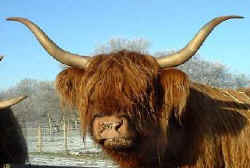 |
White
Park
The oldest breed of British
cow currently on the Endangered List. Produce exceptional quality beef. We
are expanding our White Park herd. |
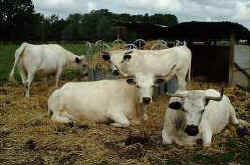 |
Sheep
We keep six different breeds of sheep
at Baylham and produce lambs every year. Our rare breed flocks are bred pure each
year with the surplus stock sold primarily for breeding with unsold animals going to the
butcher to be sold as meat. Would advise anyone with an interest in breeding stock
to let us know as soon as possible as we can then reserve some lambs from our next crop
once they are born in March / April.
Our list of sheep for sale is
constantly changing so if you contact us and let us know your interests we can give you
details of what is currently available. For some breeds demand often exceeds supply and
letting us know your interests before we start lambing will make things much easier
for all concerned, particularly if you are looking for a ram as we generally castrate ram
lambs within a week of birth but will keep back a good quality ram lamb and leave him
entire if asked to do so. |
Llanwenog
An excellent breed which is currently
much sought after. Over the years we have become so impressed with the breed that we have
disposed of our commercial flock in order to increase our Llanwenog numbers. They
are Britain's most prolific breed. They are absolutely superb mothers and we have found
that they will adopt lambs without any of the normal problems associated with
adoption. They have an excellent fleece and produce a good carcass. If needed
they will also produce a good cross bred lamb with good conformation and early finishing. |
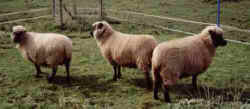
Llanwenog ewes
|
Balwen
An unusual breed originating from one
particular valley in Wales. The breed society have to inspect all lambs before
registration and the white markings are all important. A ram can only be registered
if it has the perfect markings of an unbroken white nose blaze, four white socks and half
a white tail. The ewes are inspected but on a less rigorous basis. |
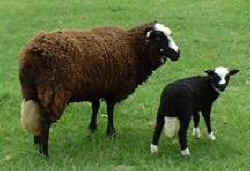
Balwen ewe and lamb |
Herdwick
Britain's hardiest sheep coming from
the mountains in the Lake District. Produce the most docile lambs. Much sought after
and we usually have a waiting list for the lambs. |
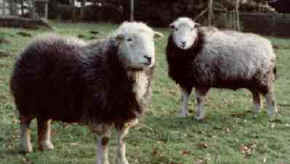
Herdwick ewes |
Norfolk Horn
A breed now classed in Category 2
(Endangered). Will thrive on poor grazing. Good quality fine fleece. Produce a
very good carcass finishing a little more slowly than the Suffolk (which was originally
developed from a Norfolk Horn, Southdown cross) |
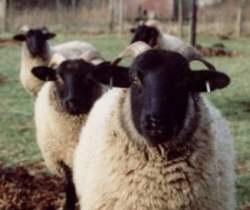
Young Norfolk Horn ewes |
Greyface
Dartmoor
A very attractive sheep producing a
very heavy lustre wool fleece. Produce a good meat lamb when crossed with a terminal
sire such as a Suffolk or a Llanwenog. |
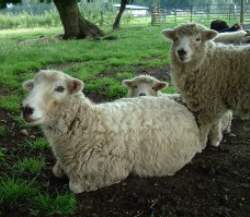
Greyface Dartmoor ewe and lambs |
Ouessant
Supposedly the world's smallest naturally occurring
sheep. They originate from the Isle de Ouessant, a tiny island off the Brittany
coast in France. They are very rare in the UK. |
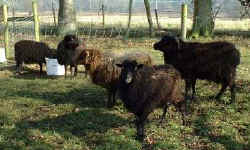 |
Pigs
We breed Berkshires,
Middle Whites and
Kune Kunes (Cooney Cooneys), the delightful Maori pigs from New Zealand |
Berkshire
In
the 19th Century, when a lot of livestock development was happening, a number of small pig
breeds were created by crossing native British pigs with imported Chinese or Neapolitan
animals. Most of these smaller breeds were not profitable and, with the
exception of the pigs which became the Berkshire, had all died out by 1914 |
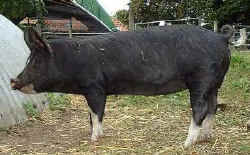 |
| Middle White The Middle White is thought to have been created by crossing
the Large White with the early maturing Small White, a breed now extinct. The Middle
White is also known as the London Pork Pig as it produces quality pork and was extensively
reared to supply the capital with the succulent meat for which it had become famous.
A characteristic of the Middle White is the dished face with a rather squashed in nose. |
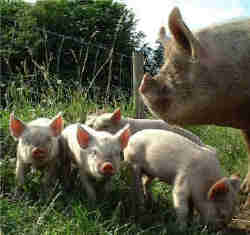 |
| Kune Kune The Maoris in New Zealand kept Kune Kunes both as pets and for
meat, allowing them to roam freely to scavenge in and around the village
houses. This close association with man probably accounts for the Kune Kune's love
of humans and their placid and friendly temperament.
If grass is available they will graze and do not
dig up their pasture. They will thrive on a diet of grass, fruit and vegetables with
a small amount of protein meal when the grass is in short supply. |
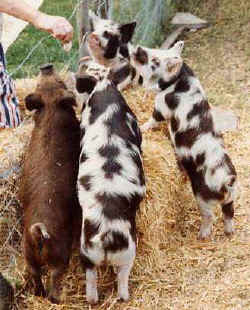 |
Pygmy
Goats
We have several pygmy goats in various
colours. We will be breeding from them again in the future. We usually find
that the kids have been sold long before they are born so, anyone wanting a kid had better
let us know as soon as possible. We have several contacts who also breed pygmies and
have often managed to find kids for people who are too late to book one of our own kids. |
Poultry
We breed both Black Silkies and White
Silkies, Crested Polands, Scots Greys, Buff Sussex, Ixworths and Scots Dumpies.
|
We have reluctantly decided that we
have far too many animals and that we have to reduce numbers. Details of some of the
currently available stock are given on our website:
www.baylham-house-farm.co.uk

|